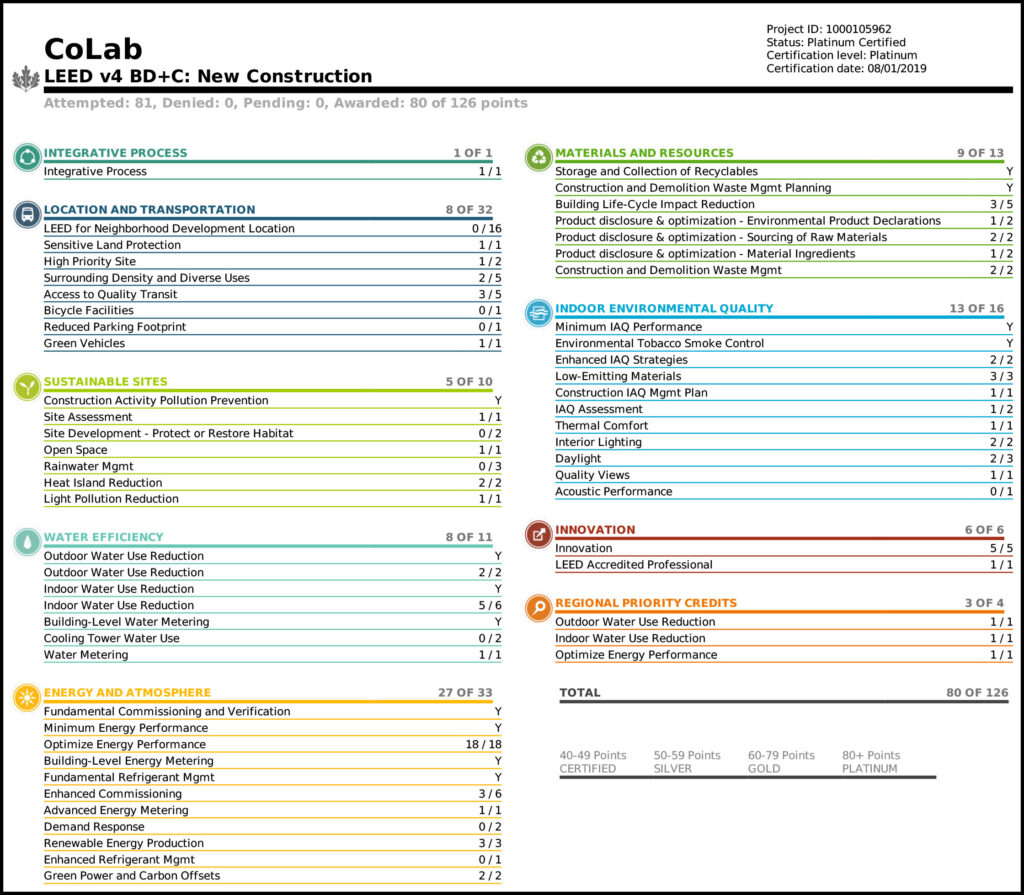Co|Lab Certifications
Given the type of work we hope Co|Lab will inspire across our industry, it was only fitting to achieve the most rigorous green building certifications.
U.S. Green Building Council (USGBC) v4 Platinum
Below are highlights from credits achieved within each of the USGBC LEED v4 credit categories:
- Integrative Process: The unique relationship with HITT as client and contractor made for an incredibly integrative design process and allowed the project to earn the associated LEED credit. The project team co-created the project vision and design imperatives, which was paramount to ensuring the innovation goals and rigorous demands for both LEED and LBC certification programs.
- Location and Transportation: Co|Lab was able to achieve the Green Vehicles credit by providing two dedicated spaces with access to electric vehicle charging as well as two dedicated spaces to green vehicle parking.
- Sustainable Sites: Co|Lab was able to achieve the Open Space credit by ensuring over 30% of the total site area was open space, and that 89% of the open space was vegetated. The open space area provides year-round visual interest with a variety of trees and plant species.
- Water Efficiency: By installing ultra-low flow water fixtures throughout the interior of the building, the project was able to achieve a 45% reduction from baseline for Indoor Water Use Reduction.
- Energy and Atmosphere: With on-site photovoltaic solar panels, Co|Lab is projected to produce 118% of our total building energy consumption, resulting in a net-positive building. This strategy allowed the project to earn maximum points for Renewable Energy Production.
- Materials and Resources: Co|Lab focused on transparency and material health as a key design element of the project and installed 25 Environmental Product Declarations (EPDs), which allowed for the achievement of BPDO- Environmental Product Declarations.
- Indoor Environmental Quality: The facility earned both the Daylight and Views credits by emphasizing our efficiency and occupant comfort goals from the start. The design team simulated various conditions to analyze site orientations and was able to document 62% of regularly occupied floor area as daylit and 76% with access to quality views.
- Innovation: As part of Co|Lab’s goal to educate people about the facility’s design strategies as well as our ongoing programming, we have incorporated a green education program which includes a website and tours which also allowed the project to earn the Green Education credit.
- Regional Priority: With Washington D.C.’s commitment to net zero energy buildings and lowering the city’s carbon footprint, Co|Lab is aligned with minimizing energy consumption by maximizing daylight and incorporating only LED lighting.
- Regional Priority: As a building expected to generate more energy than it uses, Co|Lab embodies many of the goals of municipalities such as Washington D.C by focusing on efficiency as well as renewable energy production. The project was able to earn all 19 possible points by leveraging this regional priority.

ILFI Petal Certification
- Co|Lab has received the International Living Future Institute’s rigorous Petal Certification
- The Materials petal largely focuses on 100% material transparency through extensive documentation. Excluding Red List chemicals is a top priority, along with local material sourcing.
- The Place petal advocates for human-powered transportation and incorporating green spaces amongst our built environment – an environmental approach to community design. Co|Lab has partnered with local communities to create community gardens with edible plants.
- The Beauty petal advocates for aesthetics and design strategies that people want to take care of. Co|Lab has embraced public art and a sleek, contemporary aesthetic to achieve this petal.
Zero Energy Certification
- We are currently auditing our energy consumption and production to monitor operations over a 12-month period. Co|Lab will earn this certification if the on-site photovoltaic solar array produces at least as much energy as the building consumes over these 12 months.

